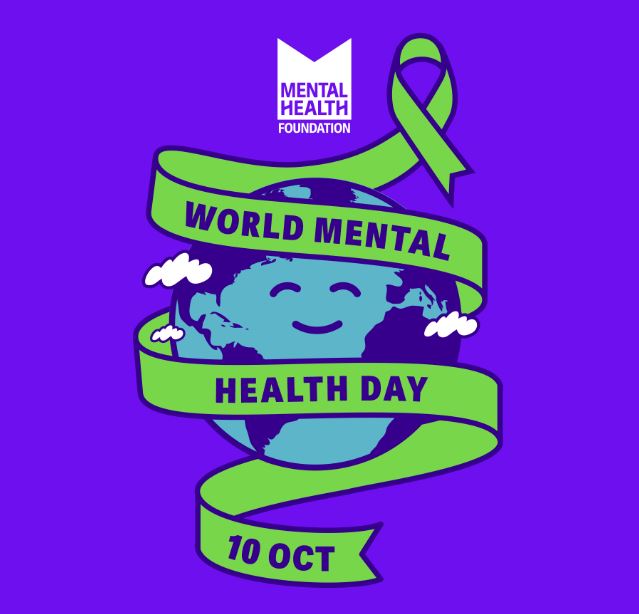"Es hora de dar prioridad a la salud mental en el lugar de trabajo. "
El 10 de octubre se celebra el Día Mundial de la Salud Mental. Una campaña anual, que se celebra desde 1992, cuyo objetivo es sensibilizar a la población sobre este tema. Cuenta con el apoyo de la Organización Mundial de la Salud (OMS) y la Federación Mundial de Salud Mental (FMSM).
El tema oficial de este año (fijado anualmente por la WFMH) es: "Es hora de dar prioridad a la salud mental en el lugar de trabajo". La Mental Health Foundation UK afirma: "El tema destaca la importancia de abordar la salud mental y el bienestar en el lugar de trabajo, en beneficio de las personas, las organizaciones y las comunidades."
En 2019, la OMS estimó que una de cada ocho personas vivía con un trastorno mental. El inicio de la pandemia de Covid-19 creó entonces una crisis mundial con una presión y un estrés extremos que afectaron a la salud emocional de millones de personas. Las estimaciones sugieren que esta cifra podría haber aumentado hasta en un 28%, con el Instituto Nacional de Salud Mental de Estados Unidos (NIMH), sugiriendo que 1 de cada 5 adultos en Estados Unidos viven actualmente con una enfermedad mental.
Muchos esperaban que la situación mejorara con la vuelta a la normalidad, pero tanto si se trata de los efectos a largo plazo de semejante catástrofe global como del impacto de otros preocupantes acontecimientos mundiales -incluida la guerra entre Ucrania y Rusia, la escalada de violencia en Israel, Gaza y Líbano, y la creciente tensión en todo Oriente Próximo-, el número de personas que luchan contra los trastornos mentales parece seguir aumentando.
La salud psicológica es tan importante como la salud física, y una puede tener graves repercusiones en la otra. Trastornos como la depresión aumentan el riesgo de padecer enfermedades crónicas a largo plazo, como diabetes y cardiopatías. Del mismo modo, quienes padecen enfermedades crónicas tienen más riesgo de desarrollar una enfermedad mental.
Más de 60% de la población mundial trabaja, y muchos de nosotros pasaremos gran parte de nuestra semana en el trabajo. La Mental Health Foundation UK calcula que 15% de los trabajadores del Reino Unido padecen alguna enfermedad mental y que 875.000 trabajadores sufren estrés, depresión y ansiedad relacionados con el trabajo.
En este Día de la Salud Mental, la FMMH y la OMS quieren arrojar luz sobre un importante problema que afecta a las personas en el lugar de trabajo: el agotamiento profesional.
El agotamiento es una enfermedad que deja a quienes la padecen física y emocionalmente exhaustos. Suele estar causado por largos periodos de presión intensa, grandes responsabilidades o estrés excesivo. Cualquiera de estos factores puede dejar a las personas agotadas y abrumadas física y mentalmente.
En muchos casos, la enfermedad está relacionada con el trabajo y a veces se denomina agotamiento ejecutivo u ocupacional, ya que es el resultado de un estrés laboral crónico. Puede deberse a largas jornadas de trabajo, demasiada responsabilidad, agotamiento por exigencias constantes o incesantes de tiempo o energía, o un entorno laboral tóxico.
Lea más sobre cómo su trabajo puede estar afectando a su salud mental en nuestro blog - https://www.ibizacalm.com/is-your-job-affecting-your-mental-health/

El estrés y el agotamiento provocan sentimientos de impotencia, cinismo, desilusión y resentimiento. También puede manifestarse en síntomas físicos como dolores de cabeza, problemas estomacales y una mayor vulnerabilidad a los virus similares al resfriado y la gripe. La persona tendrá ganas de huir, será incapaz de enfrentarse a las situaciones y los problemas cotidianos le resultarán abrumadores.
El agotamiento suele ir acompañado de trastornos mentales como ansiedad, depresión o abuso de sustancias.
Uno de los mayores problemas de los trastornos mentales es que a menudo dejan a la persona que los padece aislada. Esto significa que muchas personas no reciben la ayuda que necesitan. Posiblemente por miedo, vergüenza o simplemente porque no saben que hay ayuda disponible. En primer lugar, puede ser increíblemente difícil admitir que algo va mal, y luego hace falta mucho valor para hablar.
El Día Mundial de la Salud Mental es una oportunidad para hablar de salud mental, de cómo debemos cuidarla, de lo importante que es hablar de las cosas y de cómo obtener ayuda si se tienen problemas.
¿Qué es la salud mental?
La salud mental se refiere a nuestro bienestar intelectual, evolutivo y emocional. Una enfermedad mental, a veces denominada trastorno, puede alterar nuestros pensamientos, sentimientos y comportamientos.
El estado de nuestra salud psicológica influye en todos los aspectos de nuestra vida. Afecta a nuestra perspectiva emocional, a nuestra salud física y a nuestras necesidades, e influye en todas nuestras relaciones: con los seres queridos, los amigos y las personas con las que nos relacionamos en el trabajo o en la escuela.
Algunas de las enfermedades más comunes son:
Hay muchas más, y todas ellas pueden ser desde ocasional o levemente perturbadoras para la vida de una persona, hasta tener un grave impacto diario; y pueden provocar que las personas se autolesionen, abusen de sustancias e intenten suicidarse.
¿Cuáles son las causas de las enfermedades y trastornos mentales?
No existe una única causa para las enfermedades mentales. Puede afectar a cualquier persona, independientemente de su edad, raza o clase social. La personalidad, las experiencias vitales y la salud física pueden influir en el desarrollo de un problema de salud mental. Algunas personas están genéticamente más predispuestas a padecer este tipo de enfermedades, mientras que otras pueden desarrollarlas a causa de un incidente violento o chocante.
El estrés y los traumas pueden ser desencadenantes. Tanto si le ocurren a la propia persona como a alguien cercano, las experiencias angustiosas pueden tener un efecto importante en el bienestar físico y mental.
Eventos como:
Otros factores que pueden contribuir al riesgo de desarrollar una enfermedad mental son:
También es importante recordar que la salud mental de una persona puede cambiar con el tiempo. Junto con la experiencia de un acontecimiento importante, las personas también pueden verse afectadas cuando las exigencias que se les imponen van más allá de sus capacidades de afrontamiento. Si deben soportar largos periodos de presión intensa, gran responsabilidad o estrés excesivo. Por ejemplo, si trabajan muchas horas, cuidan de un familiar enfermo o tienen dificultades económicas, cualquiera de estas situaciones puede dejar a la persona agotada y abrumada física y mentalmente.
Potencial early warning signs de un problema de salud mental.
Si le preocupa que un ser querido pueda estar sufriendo un problema de salud mental, a continuación le presentamos algunas señales a las que debe prestar atención:
Si reconoces uno o más de estos síntomas en ti o en alguien cercano, o si un ser querido actúa de forma errática y fuera de lo normal, habla con él, pregúntale cómo se siente, intenta entablar una conversación y, en caso de duda, busca asesoramiento profesional.
Concienciación y tratamiento de la salud mental
Los problemas de salud mental son más frecuentes de lo que se cree, pero hay ayuda disponible. Las personas pueden mejorar y muchas se recuperan por completo. El tratamiento suele incluir terapia y medicación, o una combinación de ambas.
Terapias de conversación, como la cognitivo-conductual, que es popular porque enseña a la persona a pensar y comportarse de forma diferente para que sea más capaz de controlar o detener los episodios desencadenantes.
Medicamentos como los antidepresivos, indicados para la depresión, ayudan a equilibrar las sustancias químicas del cerebro y afectan al estado de ánimo. También pueden utilizarse como tratamiento químico de la ansiedad, junto con ansiolíticos y betabloqueantes. Existen otros fármacos de venta con receta para tratar afecciones específicas; es importante someterse a una revisión exhaustiva por parte de un profesional sanitario y seguir sus consejos.
Un avance más reciente en el tratamiento de enfermedades mentales (como la adicción) es la EMT o estimulación magnética transcraneal. La EMT es una forma no invasiva de terapia de estimulación cerebral que ha demostrado ser muy eficaz en el tratamiento de afecciones neurológicas.
Personalizado salud mental y adicción rehab clínica en España

Situado en la isla balear de Ibiza, en un lugar privado, idílico y tranquilo, nuestro centro residencial de rehabilitación español es el lugar perfecto para obtener ayuda.
Tratamos a clientes con diversos problemas de salud mental, como trastornos depresivos, de ansiedad y alimentarios, consumo de drogas y alcohol, abuso de sustancias y adicción al comportamiento, codependencia y traumas.
Si desea más información o detalles sobre el ingreso en nuestro centro de rehabilitación, póngase en contacto con sharon@ibizacalm.com

